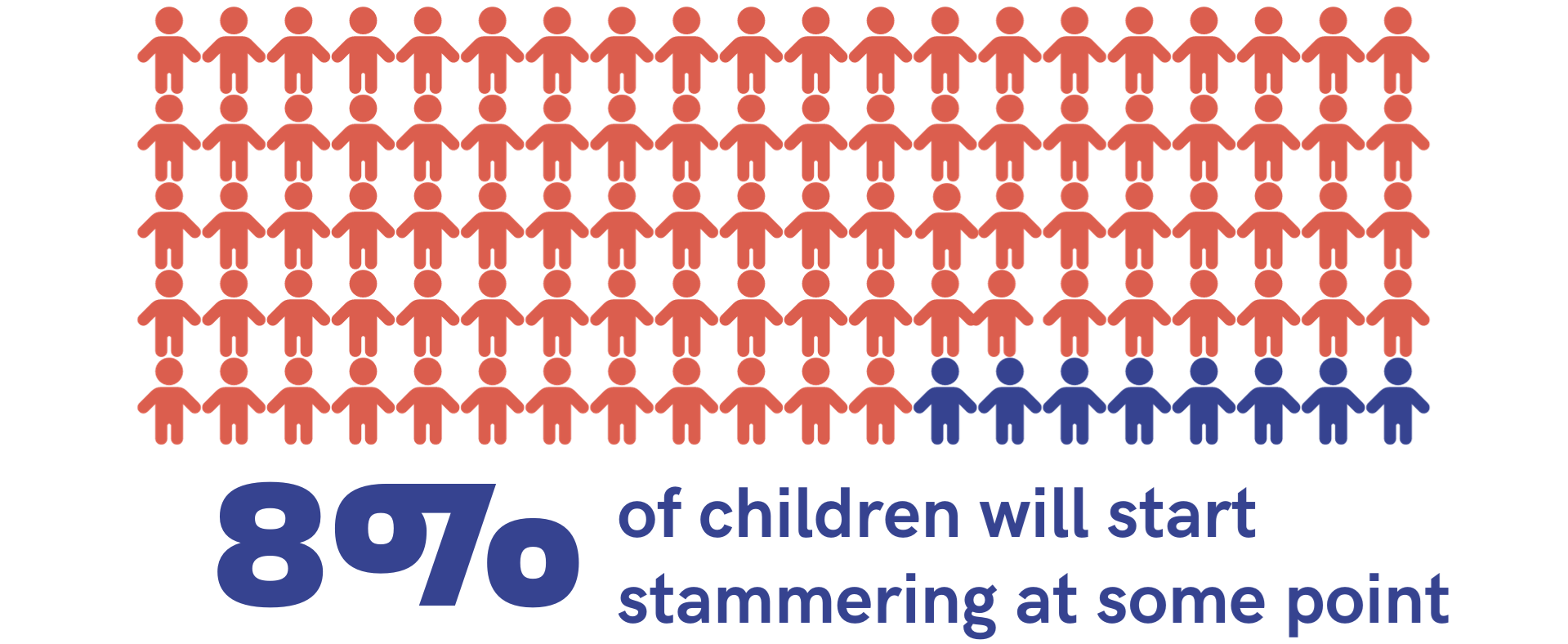What does stammering (also known as stuttering) look and sound like? When does it start? Will it stop? How common is it? Find out here.
Stammering is a difference in how speech flows.
Someone who stammers might do one or more of these things:
- Repeat sounds or words. For example "My name is J-J-J-J-John".
- Stretch or prolong sounds. For example "Can you read me a ssssssstory?".
- Have a silent block where a sound gets stuck. For example "---------Can I have…". A block could last for a few seconds or it could last longer.
These can happen at any point in a sentence.
Everyone does these things occasionally. But for people who stammer they happen more often, sometimes nearly every time they speak.

Other stammering behaviours
If they're working hard to get sounds out, someone who stammers might also:
- appear tense in their mouth, face or body
- change their breathing pattern or feel out of breath
- close their eyes or look away
- use other parts of their body to help get a word out or release tension. For example they might jerk their head, tap their fingers or stamp their feet
- say "um" or "er" or repeat a word they've already said to help launch into words they find more difficult to say.
Everyone's stammer is unique and everyone stammers differently.
It's normal for stammering to fluctuate. People can stammer less on some days or in certain situations, and more in others. Lots of people find they stammer more when they are tired.
Stammering isn't always obvious
Lots of people use ways to minimise their stammer, some or all of the time. This can be because of the negative reactions they might get if they stammer.
They might think ahead and change words to ones they can say. Or they might use a technique to manage it. You might not be able to hear it, but they'll be working hard not to stammer.
Find out more on our What Is Covert Stammering? page.
When does stammering normally start?
Most stammering starts in early childhood, between the ages of 2-5. However, in some children it can start later. It can sometimes start in adults too.
Why do people stammer?
Read What Causes Stammering? to find out what we know about why stammering starts in children and adults.
How many people stammer?
At least 1% of adults stammer. Around 8% of children — one in every 12 — start to stammer at some point.

Will stammering stop?
For most children, stammering will be temporary. Their stammer may stop naturally or following support from speech and language therapy.
Some children will continue stammering into adulthood. At the moment we can't tell which children will continue stammering and who will stop. Generally, the longer someone has been stammering, the more likely it is to continue. But there are no certainties.
There aren't any quick fixes or cures that will definitely stop people stammering. See Is there a Stammering Cure? for more about that.
But this doesn't have to be something to worry about!
For these reasons:
- People who stammer can still be great communicators.
- Stammering can change over time. People might have periods in their life when they stammer less, as well as others when they stammer a bit more.
- Many people find that as they get older they stammer less often.
- There are things which can help people speak with less struggle, if they wish. See the next header for links to our support pages. There you can find out about the different therapy and course options available.
Did you know that many famous people stammer, or stammered when they were younger? They include Emily Blunt, Ed Sheeran, Bruce Willis, Joe Biden, Rowan Atkinson and Samuel L. Jackson. Marilyn Monroe, Elvis Presley and Charles Darwin all stammered too. Read about these and other Influential People Who Stammer.
What should I do about stammering?
If you are worried about stammering and would like support, see our sections:
Call our helpline on 0808 802 0002 or start a webchat if you'd like to talk about it.
Is stammering different to stuttering?
No, stammering and stuttering are the same thing.
'Stammering' is what most people in the UK, Ireland and India call it. In North America and Australia most people call it 'stuttering'. But there is no difference between them.
Is stammering related to any other conditions?
Yes, some conditions are closely related to stammering. Others can happen alongside it. We go into detail about each on the following pages:
More information & support
- Chat with us about anything on this page. Call our free helpline on 0808 802 0002 or start a webchat.
- What Causes Stammering?
- Is there a Stammering Cure?
- Is Stammering A Disability?
- If You Don't Stammer Read This. Things we want you to know.
- Supporting Someone Who Stammers. Includes guides for speaking with someone who stammers, as well as for partners, friends and educators.
What next?
- Become A STAMMA Member for free and join the community. We'll keep you updated with our activities.
- Get involved with the STAMMA community. Find an event, fundraise, share your story, volunteer, take part in research and more.
Donate & make a difference
Creating this page was only possible thanks to your kind donations.
Please consider making a donation to STAMMA: click here. You'll be helping us to:
- keep our support services running for people who stammer and worried parents
- put on workshops and support groups
- stage events to bring people together
- create guides for teachers and employers
- create our award-winning campaigns for change.
Thank you.
Our information
Find out How We Produce Our Information.
What did you think of this page? Give us your feedback, we'd love to hear from you.




































